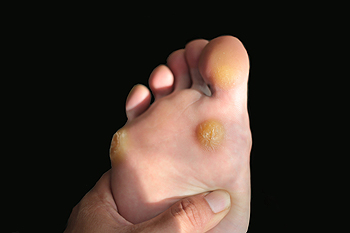 A corn on the foot appears as a small, hard circle which acts as a skin protector against pressure that poorly fitting shoes may cause. There are typically two types of corns that can develop. Hard corns are generally caused by shoes that fit tightly and appear on the side of the pinky toe. The toe and surrounding area may become inflamed from the added pressure, causing friction and aiding in the development of corns. Soft corns are known to develop in between the toes and thrive on the sweat and moisture in that area. Occasionally, soft corns may develop as a result of a predisposed inherited bone malformation, causing the skin on two toes to rub together, generating friction. Research has shown that wearing wider shoes while performing daily activities may prevent the formation of corns. If you are afflicted by this condition, please consider a consultation with a podiatrist for proper treatment options.
A corn on the foot appears as a small, hard circle which acts as a skin protector against pressure that poorly fitting shoes may cause. There are typically two types of corns that can develop. Hard corns are generally caused by shoes that fit tightly and appear on the side of the pinky toe. The toe and surrounding area may become inflamed from the added pressure, causing friction and aiding in the development of corns. Soft corns are known to develop in between the toes and thrive on the sweat and moisture in that area. Occasionally, soft corns may develop as a result of a predisposed inherited bone malformation, causing the skin on two toes to rub together, generating friction. Research has shown that wearing wider shoes while performing daily activities may prevent the formation of corns. If you are afflicted by this condition, please consider a consultation with a podiatrist for proper treatment options.
If you have any concerns regarding your feet and ankles, contact one of our podiatrists of Princeton Foot & Ankle Associates. Our doctors will treat your foot and ankle needs.
Corns: What Are They? and How Do You Get Rid of Them?
Corns can be described as areas of the skin that have thickened to the point of becoming painful or irritating. They are often layers and layers of the skin that have become dry and rough, and are normally smaller than calluses.
Ways to Prevent Corns
There are many ways to get rid of painful corns such as wearing:
- Well-fitting socks
- Comfortable shoes that are not tight around your foot
- Shoes that offer support
Treating Corns
Treatment of corns involves removing the dead skin that has built up in the specific area of the foot. Consult with Our doctors to determine the best treatment option for your case of corns.
If you have any questions please feel free to contact our offices located in Princeton, and West Windsor, NJ . We offer the newest diagnostic and treatment technologies for all your foot and ankle needs.
